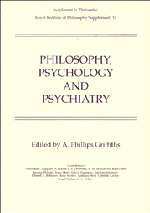Book contents
- Frontmatter
- Contents
- Preface
- Introduction: Just Getting Started
- Mind and Madness: New Directions in the Philosophy of Psychiatry
- Emotion and Memory: The Second Cognitive Revolution
- Meaning and Mechanism in Psychotherapy and General Psychiatry
- Making Sense on the Boundaries: On Moving Between Philosophy and Psychotherapy
- Mental Disorder, Illness and Biological Disfunction
- Integrity, Boundary and the Ecology of Personal Processes
- Multiple Personality and Computational Models
- Psychology and Politics: Lies, Damned Lies and Self-Deception
- Personal Identity and Psychiatric Illness
- Vices and the Self
- Wild Beasts and Idle Humours: Legal Insanity and the Finding of Fault
- Dangerousness and Mental Disorder
- Problems with the Doctrine of Consent
- Homosexuality
- Nietzsche and Music
- References
- Notes on Contributors
Vices and the Self
Published online by Cambridge University Press: 03 May 2011
- Frontmatter
- Contents
- Preface
- Introduction: Just Getting Started
- Mind and Madness: New Directions in the Philosophy of Psychiatry
- Emotion and Memory: The Second Cognitive Revolution
- Meaning and Mechanism in Psychotherapy and General Psychiatry
- Making Sense on the Boundaries: On Moving Between Philosophy and Psychotherapy
- Mental Disorder, Illness and Biological Disfunction
- Integrity, Boundary and the Ecology of Personal Processes
- Multiple Personality and Computational Models
- Psychology and Politics: Lies, Damned Lies and Self-Deception
- Personal Identity and Psychiatric Illness
- Vices and the Self
- Wild Beasts and Idle Humours: Legal Insanity and the Finding of Fault
- Dangerousness and Mental Disorder
- Problems with the Doctrine of Consent
- Homosexuality
- Nietzsche and Music
- References
- Notes on Contributors
Summary
I am interested in those vices which appear on lists of ‘deadly Sins’, not from any theological point of view but because of the insight revealed in their selection as being ‘death to the soul’, which I understand as ‘corruptive of the self’. ‘Corruption’ is here to be taken in a literal sense as ‘destruction or dissolution of the constitution of a thing which makes that thing what it is’ (OED). Such corruption is to be found in the structure of the will. Aquinas thought that vice consists in desire gone wrong because uncontrolled by reason. Perhaps what follows can be seen as an interpretation and filling out of this view.
The thesis outlined in this article takes seriously and offers some support to two slogans of traditional Virtue-theory: the virtues are needed by individual agents for their lives to flourish; and: virtue is knowledge. The support, however, is partial, indirect and negative. My claim is that there are at any rate some vices which are so fundamentally harmful to the agent herself that it must be in her own interest to cultivate such virtues which should prevent their occurrence or mitigate their impact. My reason for this negative approach is that the relevant harm can be spelt out more clearly than could any positive flourishing, and hence its destructiveness demonstrated more precisely than could be the constructive contribution of a virtue.
- Type
- Chapter
- Information
- Philosophy, Psychology and Psychiatry , pp. 145 - 158Publisher: Cambridge University PressPrint publication year: 1995



